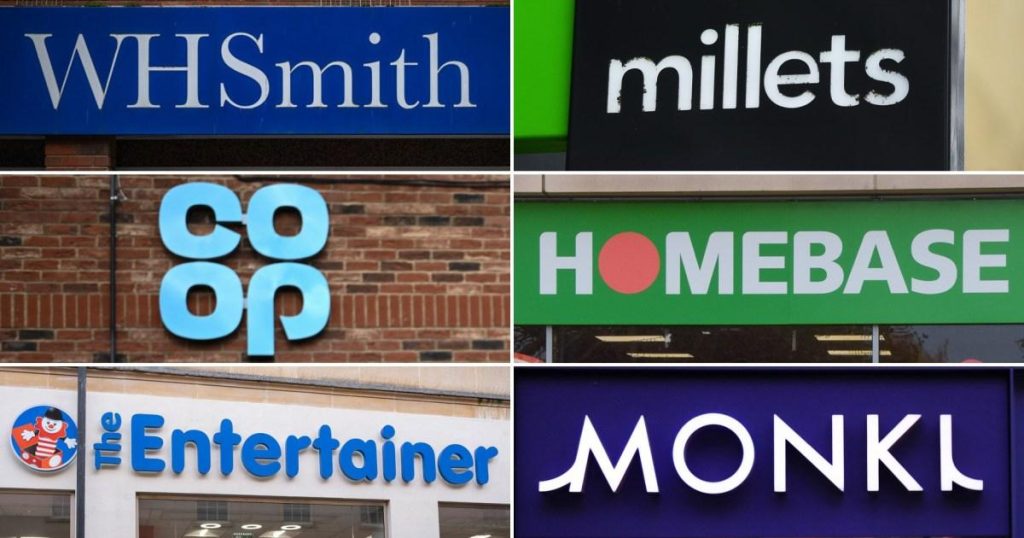The British high street continues to face significant challenges in 2025, mirroring the difficulties experienced in previous years. Dwindling footfall, reduced consumer spending power due to the cost of living crisis, and changing consumer habits have contributed to a wave of store closures. Research indicates a substantial number of shops have closed in recent years, with thousands more closures predicted. This trend is affecting both large chain stores and smaller independent retailers, reshaping the landscape of town centres across the country. While some companies are strategically adapting to the changing retail environment, others are struggling to maintain profitability in the face of increasing economic pressures. The start of 2025 brings further closures, signalling continued uncertainty for the future of the high street.
WHSmith, the well-known stationery retailer, embodies this complex picture of adaptation and contraction. While closing some branches, including its Winton location in Bournemouth, the company is simultaneously pursuing an expansion strategy. This involves opening new stores in high-traffic areas like airports, train stations, and hospitals, both within the UK and internationally, particularly in the United States. This dual approach reflects a strategic shift towards travel retail and a focus on locations with consistent customer flow. Furthermore, WHSmith is diversifying its offerings through partnerships, such as introducing Toys R Us concessions within some UK stores. However, the company is also implementing cost-cutting measures to address declining sales, highlighting the ongoing challenges even for established retailers.
The fashion sector is also experiencing significant upheaval. Monki, the youth-focused brand owned by H&M, is closing all of its UK stores in 2025. This decision reflects a broader trend of consolidation within the fashion industry, as companies seek to streamline operations and maximize profitability. H&M’s strategy involves merging Monki with its sister brand, Weekday, to create a single, unified offering targeting younger demographics. This move highlights the challenges faced by individual brands within larger retail groups and the increasing importance of adapting to changing consumer preferences and market conditions.
The toy retail sector is also feeling the pinch. The Entertainer is closing its Edinburgh branch, marking the end of a decade-long presence in the Cameron Toll shopping centre. While specific reasons for this closure haven’t been officially disclosed, external economic factors like increased National Insurance contributions are impacting the retail landscape and influencing expansion plans. This closure illustrates the difficulties faced by even specialized retailers in maintaining profitability amidst rising costs and changing market dynamics.
The grocery sector is undergoing its own transformations. The Co-op is closing 19 food stores across England, a move attributed to the financial unsustainability of these locations. While the Co-op is simultaneously opening new stores and refurbishing existing ones, the closures underscore the challenging operating environment for supermarkets, particularly in a competitive market with evolving consumer shopping habits. The repurposing of some of these closed stores as B&M branches, and the acquisition of others by Samy Limited, indicates the ongoing evolution and reconfiguration of the retail landscape.
The outdoor retail sector is also experiencing change. Millets, the outdoor clothing and equipment retailer, is closing several stores, some of which will be rebranded under its sister brand, Go Outdoors. This strategic move reflects the parent company, JD Outdoors, prioritizing the expansion of the Go Outdoors brand, which has a larger nationwide presence. This consolidation and rebranding strategy highlights the challenges faced by smaller, specialized retailers in a competitive market and the increasing importance of leveraging brand recognition and economies of scale.
Homebase, the DIY and home improvement retailer, continues to face difficulties. The company is closing several stores in early 2025, following previous closures in late 2024. Homebase’s struggles are rooted in its acquisition by Hilco Capital and subsequent restructuring, which has led to numerous store closures. Although some locations were acquired by The Range, the company remains vulnerable in the competitive DIY market. This ongoing struggle highlights the challenges of navigating a competitive market while undergoing significant restructuring and adapting to changing consumer demands.
These closures across various sectors paint a picture of a dynamic and evolving retail landscape. Companies are adapting to changing consumer habits, economic pressures, and increasing competition. While some are expanding and diversifying, others are consolidating or exiting the market altogether. The high street of the future will likely be a blend of established players, new entrants, and adapted business models, reflecting the ongoing transformation of the retail sector. The challenges and changes experienced by these retailers underscore the need for innovation, adaptability, and a keen understanding of consumer needs in the ever-evolving world of retail. The closures are not simply isolated events but rather indicative of broader trends shaping the future of the high street.




